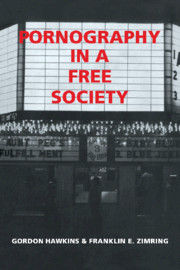Book contents
- Frontmatter
- Contents
- List of tables and figures
- Preface
- Acknowledgments
- I Pornography and the pornography commissions
- II Public policy after liberalization
- Introduction
- 6 Pornography and the subjugation of women: the radical feminist challenge
- 7 Pornography and child protection
- 8 Pornography in perspective: social response in the noncensoring society
- 9 Notes toward the future
- References
- Index
8 - Pornography in perspective: social response in the noncensoring society
Published online by Cambridge University Press: 21 October 2009
- Frontmatter
- Contents
- List of tables and figures
- Preface
- Acknowledgments
- I Pornography and the pornography commissions
- II Public policy after liberalization
- Introduction
- 6 Pornography and the subjugation of women: the radical feminist challenge
- 7 Pornography and child protection
- 8 Pornography in perspective: social response in the noncensoring society
- 9 Notes toward the future
- References
- Index
Summary
This chapter attempts to break down a false antithesis that has dominated debate about social policy toward pornography; it also discusses a range of policy options available to governmental and to nongovernmental entities in responding to pornography. The false antithesis is the notion that there are only two possible collective responses to pornography as a social issue: the imposition of censorship, or the toleration of anarchy. Those who have sought to use government power to minimize the possible effects of pornography have usually assumed that the only effective way of controlling the social damage believed to be caused by pornography is a system of prior restraint enforced with substantial criminal penalties.
Here we explore the possibilities of a middle path. After reviewing some of the reasons for the bipolar terms of the debate about pornography, we discuss some of the control strategies that private groups can use in responding to the challenge of available pornography as well as appropriate roles for local, state, and federal government other than censorship.
In adopting the assumption that the only alternative to censorship is passivity and limitless tolerance, the opponents of pornography have had the support of many of those groups in society opposed to the censorship of pornographic material. The opponents of censorship rarely speak of collective alternatives to censorship because they do not regard the free availability of pornography as causing any problems.
- Type
- Chapter
- Information
- Pornography in a Free Society , pp. 198 - 217Publisher: Cambridge University PressPrint publication year: 1989

